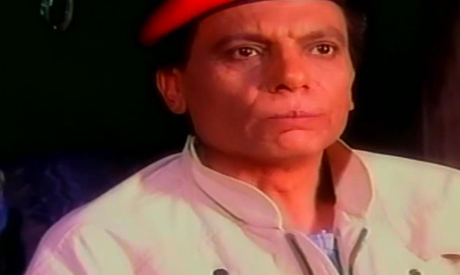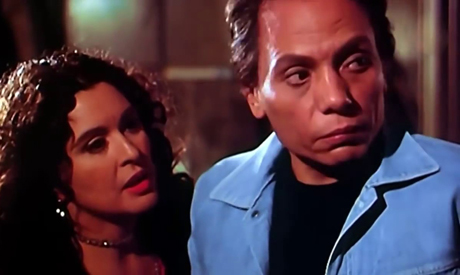The celebrated Egyptian filmmaker Samir Seif passed away Monday evening at the age of 72.
The farewell notes of his former students especially went viral on social media. Seif taught at the Higher Film Institue, where he graduated in 1969, earned his masters and PhD (on Egyptian action films) in 1991 and 1999 respectively.
Seif made his first film, Daerat Al-Intikam (Circle of Revenge), an adaptation of Alexander Dumas’s The Count of Monte Cristo starring Nour Al-Sherif, Mervat Amin and Shwikar, in 1976. Having started out as an assistant to the late director Hassan Al-Imam on Khali Balak Min Zouzou (Watch Out for Zouzou, 1972), starring the legendary Soad Hosni and written by the great Salah Jahin, he went on to work with comedy superstar Adel Imam as well as Youssra, the late Ahmed Zaki, and the late Nour Al-Sherif – the greatest stars of his day. He also headed the jury of Alexandria Film Festival in 1993, he assisted Franklin Schaffner on Sphinx (1980) and Spike Lee on Malcom X (1992).
Seif also directed many popular television series including an early docuseries on the late matinée idol Farid Shawki as well as Nour Al-Sabah (Morning Light) starring Laila Elwi, Bel Shamei Al-Ahmar (Red Tape) starring Youssra and, most recently, Ibn Mout (Son’s Death) starring Khaled Al-Nabawi in 2012. He also directed a play and four musicals.
He will probably be best remembered for silver-screen collaborations with Imam, Al-Sherif and screenwriter Wahid Hamed. These include Al-Mashbouh (The Suspect, 1981) and Shams Al-Zanati (1991), action flicks starring Imam.

Al-Raqesa wal Seyasi
“Action,” he says in a 2002 interview he gave to Al-Ahram Weekly, “is my cup of tea” he confesses, “but each new film must present me with some kind of challenge. My ambition is to make best possible film in whatever genre I am working. If you look at my filmography, you’ll see that I’ve done romantic comedy, farce, psychological thriller – almost every genre indeed – as well as action. I am essentially a movie-goer, a movie buff, a cinephile. And you can think of all my work in movie-making, academia and production as a consequence of this fact. Action is simply one of my preferences.”
He made comedies like Al-Halfout (The Tramp, 1985), starring Imam written by Hamed, as well as Gharib fi Beity (Stranger in My Home, 1982), starring Hosni opposite Al-Sherif in the iconic role of the football player Shehata Abu-Kaf Soad Hosni in Gharib Fi Beity (Stranger in My Home, 1982). He also made Al-Raqesa wal Seyasi (The Dancer and the Politician, 1990), starring Nabila Ebeid and Salah Qabil, based on a novel story by the Ihsan Abdel-Quddous and and also written by Hamed.
His collaboration with the legendary Ahmed Zaki took place in Maali Al-Wazir (His Excellency the Minister, 2002), in which Zaki played the role of Raafat Rostom, a corrupt politician suffering from nightmares, together with Youssra, Lebleba and Hesham Abdel-Hamid.

Shams Al-Zanati
Seif’s work often demonstrated vision, and the television series Awan Al-Ward (Time of the Roses) is a good example: “It was like throwing a stone into a stagnant pond and, through seminars and discussions that went on for months after the screening, following up the ripples. This is important because, the more you avoid a controversial topic, the greater the harm. Muslim-Copt relations are not as simple as people would like to assume, but this strife, largely a function of the last three decades or so, is in my view a result of a lack of information, the fact that people don’t know enough about each other, which didn’t used to be the case.”
It was in childhood that he first developed a passion for the cinema, spending the summers in Abnoub, near Assiut, Upper Egypt, while going to school in Cairo. As a young man he read two books on cinema, and so after enrolling in Cairo University’s Faculty of Economics and Political Science he also secretly applied for the newly launched institute for cinema without his parents knowledge.
His latest contribution to cinema was another collaboration with Hamed: Deil Al-Samaka (Fish Tail, 2000), starring Amr Waked and Hanan Turk.
“My films are often accused of being foreign oriented, but you only need to go to Minya and Assiut to realise how much they affect grass-roots people, how they become part of everyday life. For me, in the end, that is all that counts.”
His latest award was the Artistic Achievement Award for Mediterranean Countries at the 33rd Alexandria International Film Festival (7-12 October), which he received for directing the Tunisian-Algerian film Augstine, the Son of Her Tears.

Al-Mashbouh
Selected filmography
*Daerat Al-Intikam (Circle of Vengeance, 1976)
*Qetta Al-Nar (Cat on a Hot Tin Roof, 1977)
*Eblis fil Madina (Satan in Town, 1978)
*Al-Motawahisha (The Savage, 1979)
*Al-Mashbouh (The Suspect, 1981)
*Gharib fi Beity (Stranger in My Home, 1982)
*Al- Ghoul (1983)
*Ehtares Min Al-Khitt (Be Ware the Khitt, 1984)
*Shawarei Min Narr (Streets of Fire, 1984)
*Akher Al-Regal Al-Mohtaremein (The Last of Respectable Men, 1984)
*The Haunted (1985)
*Al-Halfout (The Tramp, 1985)
*Al-Zaman wal Kelab (Time of the Wolves, 1986)
*Al-Nemr wal Ontha (The Tiger and the Female, 1987)
*Al-Moulid (Lost in the Mulid, 1989)
*Al-Shaytana Alati Ahabatni (The Devil who Loved Me, 1990)
*Al-Raqesa wal Seyasi (The Dancer and the Politician, 1990)
*Mosagal Khattar (Most Wanted, 1991)
*Shams Al-Zanati (1991)
*Lahib Al-Intikam (Flame of Vengeance, 1993)
*Al-Zaman wal Kelab (Of Time and Dogs, 1996)
*Eish Al-Ghorab (Mushroom, 1997)
*Souq Al-Moutaa (The Pleasure Market, 1999)
*Deil Al-Samaka (Fish Tale, 2000)
*A version of this article appears in print in the 12 December, 2019 edition of Al-Ahram Weekly.
Short link: